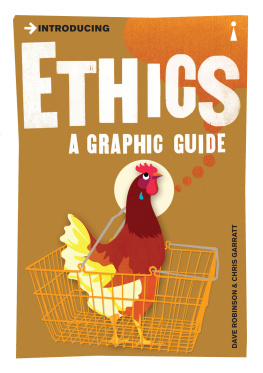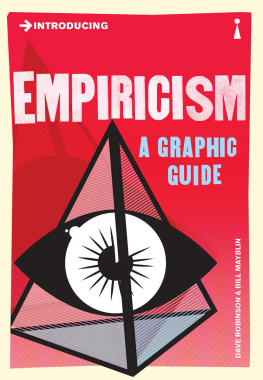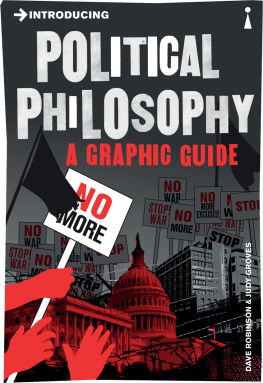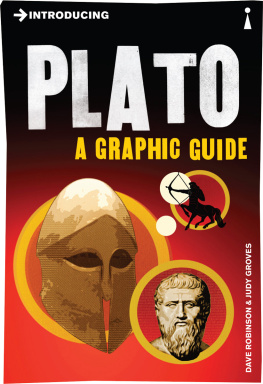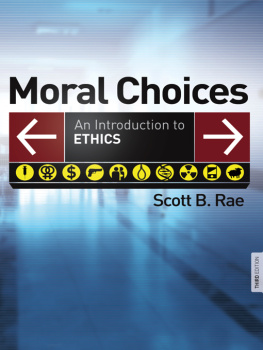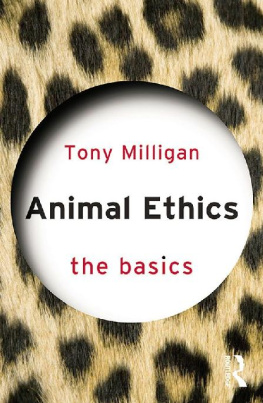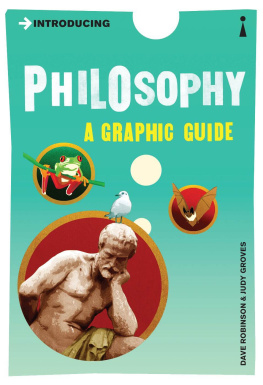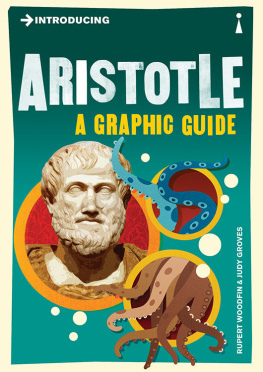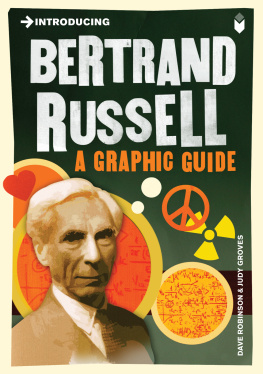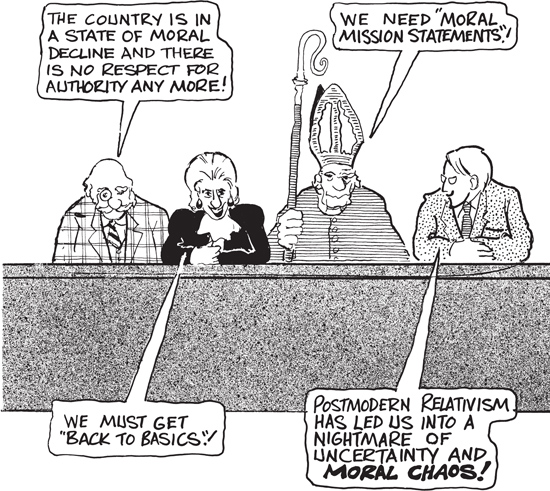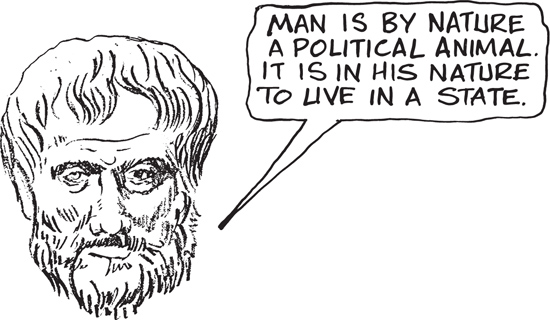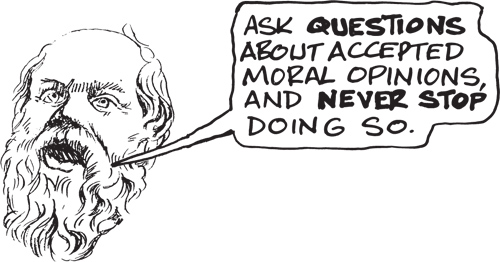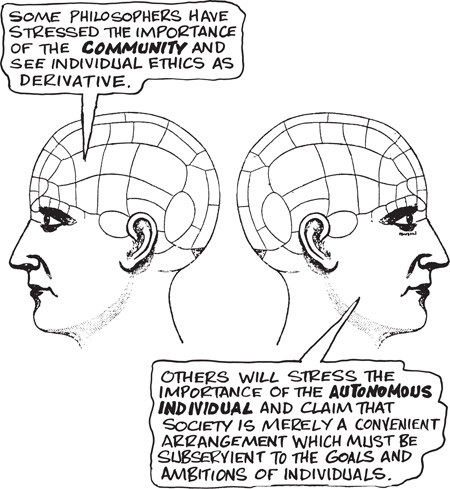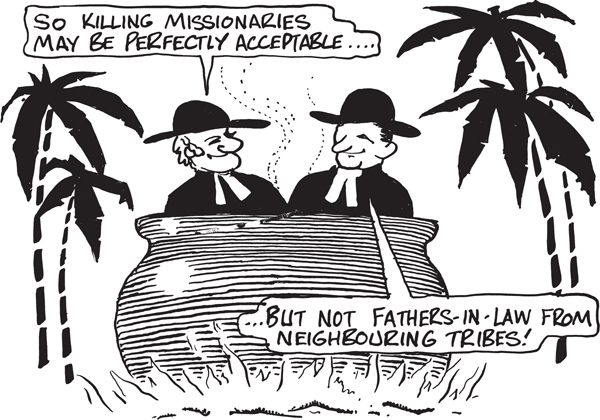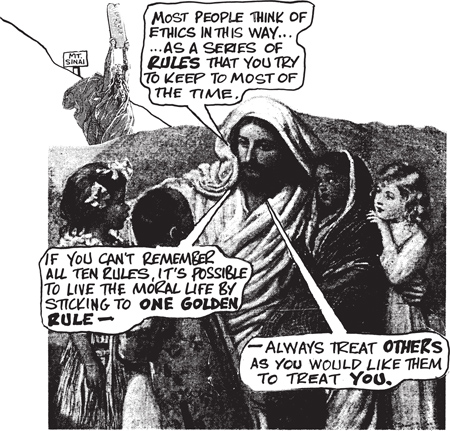Published by Icon Books Ltd., Omnibus Business Centre, 3941 North Road, London N7 9DP
email:
www.introducingbooks.com
ISBN: 978-184831-008-7
Text copyright and illustrations copyright 2013 Icon Books Ltd
The author and artist have asserted their moral rights.
Originating editor: Richard Appignanesi
No part of this book may be reproduced in any form, or by any means, without prior permission in writing from the publisher.
Contents
Moral Questions
Everyone is interested in ethics. We all have our own ideas about what is right and what is wrong and how we can tell the difference. Philosophers and bishops discuss moral mazes on the radio. People no longer behave as they should.
THE COUNTRY IS IN A STATE OF MORAL DECLINE AND THERE IS NO RESPECT FOR AUTHORITY ANY MORE! WE MUST GET BACK TO BASICS! WE NEED MORAL MISSION STATEMENTS! POSTMODERN RELATIVISM HAS LED US INTO A NIGHTMARE OF UNCERTAINTY AND MORAL CHAOS
So were told. But there have always been moral panics. Plato thought 4th century B.C. Athens was doomed because of the wicked ethical scepticism of the Sophist philosophers and the credulity of his fellow citizens.
Social Beings
We are all products of particular societies. We do not make ourselves. We owe much of what we consider to be our identity and personal opinions to the community in which we live. This made perfect sense to Aristotle. For Aristotle, the primary function of the state was to enable collectivist human beings to have philosophical discussions and eventually agree on a shared code of ethics.
MAN IS BY NATURE A POLITICAL ANIMAL. IT IS IN HIS NATURE TO LIVE IN A STATE.
But as soon as we are formed, most of us start to question the society that has made us, and do so in a way that seems unique to us. Socrates stressed that it was in fact our duty.
ASK QUESTIONS ABOUT ACCEPTED MORAL OPINIONS, AND NEVER STOP DOING SO.
The State may decide what is legally right and wrong, but the law and morality are not the same thing.
Communitarians or Individualists?
Ethics is complicated because our morality is an odd mixture of received tradition and personal opinion.
SOME PHILOSOPHERS HAVE STRESSED THE IMPORTANCE OF THE COMMUNITY AND SEE INDIVIDUAL ETHICS AS DERIVATIVE. OTHERS WILL STRESS THE IMPORTANCE OF THE AUTONOMOUS INDIVIDUAL AND CLAIM THAT SOCIETY IS MERELY A CONVENIENT ARRANGEMENT WHICH MUST BE SUBSERVIENT TO THE GOALS AND AMBITIONS OF INDIVIDUALS.
Both individualist and communitarian philosophers are reluctant to explain away ethics as no more than club rules agreed upon and formalized by members. Both want to legitimize either communal ethics or the need for an individual morality by appealing to some kind of neutral set of ideals. Much of this book is about these different attempts to provide a foundation for ethics.
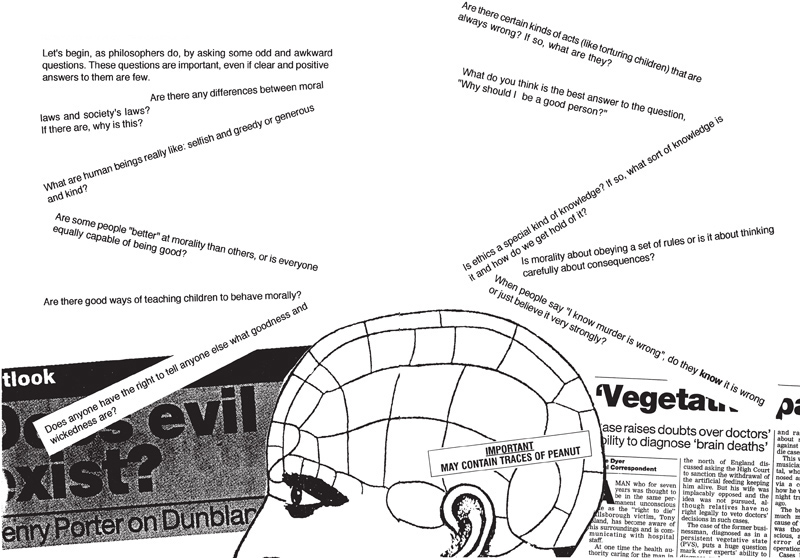
Setting the Stage Ten Central Questions Lets begin, as philosophers do, by asking some odd and awkward questions. These questions are important, even if clear and positive answers to them are few. Are there any differences between moral laws and societys laws? if there are, why is this? what are human beings really like: selfish and greedy or generous and kind? are some people better at morality than others, or is everyone equally capable of being good? Are there good ways of teaching children to behave morally? does anyone have the right to tell anyone else what goodness and wickedness are? Are there certain kinds of acts (like torturing children) that are always wrong? if so, what are they? what do you think is the best answer to the question, why should i be a good person? Is ethics a special kind of knowledge? if so, what sort of knowledge is it and how do we get hold of it? Is morality about obeying a set of rules or is it about thinking carefully about consequences? when people say i know murder is wrong, do they know it is wrong or just believe it very strongly? important may contain traces of peanut
The Social Origins of Belief Systems
It seems very unlikely that any society has ever existed in which individual members have thought the murder of others to be acceptable. Although the odd serial killer does occasionally surface in any society, most of us think of one as an exceptional aberration, or even as non-human.
There have always been rules about when men may kill other men usually outsiders as opposed to insiders.
So Killing Missionaries May Be Perfectly Acceptable. But Not Fathers-In-Law From Neighbouring Tribes!
Such moral understandings are often codified and regulated by religious and legal taboos of various kinds. Human beings seem reluctant to accept that morality is something invented by themselves and so tend to legitimize moral rules by mythologizing their origins: The Great White Parrot says stealing is wrong. The story of ethics is to some extent a description of attempts like these to legitimize morality.
Morality and Religion
Most people living in Western Christian societies would say that they base their ethical beliefs and behaviour on the ten negative commandments, rather inconveniently carved on stone tablets handed to Moses by God. (Of the ten, only about six are actually ethical.)
Most People Think Of Ethics In This Way As A Series Of Rules That You Try To Keep To Most Of The Time.If You Cant Remember All Ten Rules, ITS Possible To Live The Moral Life By Sticking To One Golden Rule Always Treat Others As You Would Like Them To Treat You.
This reciprocity rule has a long track record and is found in many different religions worldwide. It is a bit like prudent insurance a sensible way of getting along in the world, even if its not quite what Jesus Christ says. (His moral code is much more radical and not at all reciprocal. You have to do good deeds to those who have done you no good at all. This is why real Christianity is a hard act to follow.)
Is religion where morality comes from? Is being moral simply a matter of obeying divine commands? Independently-minded individuals, like Socrates (in Platos Euthyphro), said that there is more to morality than religious obedience. One reason for this is that religious commands vary from one religion to another.

